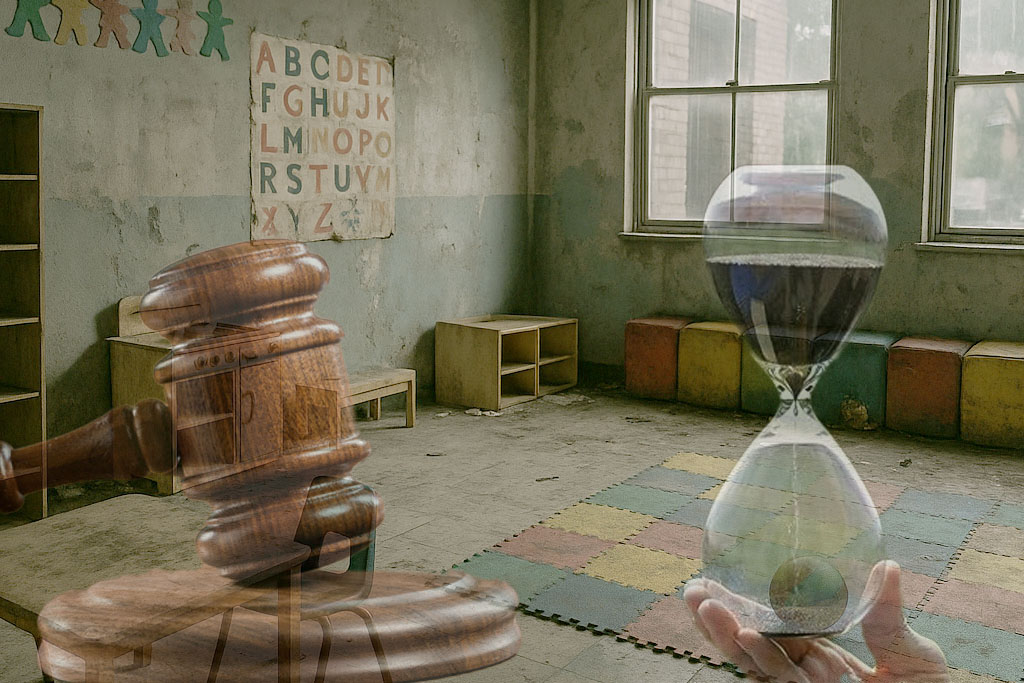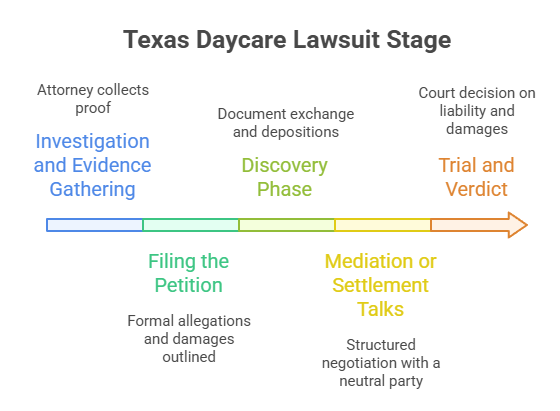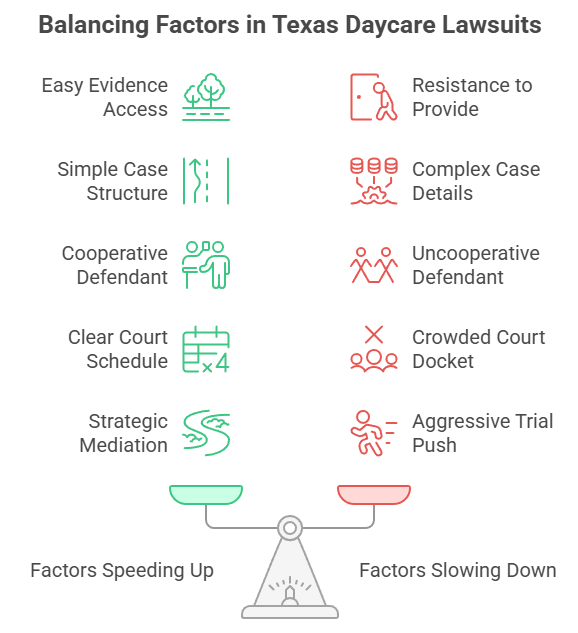How Long Does a Texas Daycare Lawsuit Take?
When your child is hurt at daycare, every day without answers feels too long. You want accountability, compensation for medical bills, and the peace of mind that comes from knowing the daycare is held responsible – but how long will it take to get there?
The truth is, Texas daycare lawsuits can be resolved in months or stretch over years, depending on the facts of the case and the choices you make early on. Knowing the legal deadlines, the steps in the process, and the factors that can speed up – or slow down – your case can help you make smarter decisions and protect your child’s rights from day one.

If your child has been injured in a Texas daycare, don’t wait for the clock to run out. The timeline starts now – here’s what you need to know.
Texas Statute of Limitations for Daycare Lawsuits
Texas law sets strict deadlines – known as the statute of limitations – for filing lawsuits. If you miss the deadline, your case will almost always be dismissed, no matter how strong the evidence is. For daycare-related injury or abuse claims, the timing depends on the nature of the case and the age of the child.
General rule for injury claims in Texas:
- Most daycare injury cases must be filed within two years of the date the injury occurred.
Special rules for cases involving children:
- For minors, Texas law “tolls” (pauses) the statute of limitations until the child turns 18 in some personal injury cases. That means the clock may not start running until adulthood. However, waiting can be risky because evidence – like witness memories, surveillance footage, and facility records – can be lost over time.
- If the claim is for wrongful death, the two-year period begins on the date of death, regardless of the child’s age.
- For claims involving intentional harm or abuse, civil and criminal cases may run in parallel, and the criminal process can sometimes extend your filing window.
Filing Deadlines in Texas Daycare Cases:
| Claim Type | Filing Deadline | Special Considerations |
|---|---|---|
| Personal injury (child victim) | 2 years (may be tolled until age 18) | Early filing recommended for evidence preservation |
| Wrongful death | 2 years from date of death | Applies to parents or estate |
| Intentional harm/abuse | 2 years | Criminal cases may impact civil timelines |
The safest approach is to treat the two-year limit as your working deadline, even in cases where tolling might apply. This ensures your attorney has time to investigate, gather evidence, and file well before the statute runs out.
Stages of a Texas Daycare Lawsuit
Every daycare lawsuit follows a basic framework, but the length of each stage can vary depending on the complexity of the case, the cooperation of the parties, and court scheduling. Understanding the process helps parents know what’s coming and why certain steps can’t be skipped.

1. Investigation and Evidence Gathering
This is where your attorney collects all available proof, including medical records, incident reports, witness statements, and any surveillance footage from the daycare. They may also request staff training records, safety inspection reports, and prior complaint histories. A thorough investigation sets the foundation for your case and can take weeks to months, depending on how quickly records are released.
2. Filing the Petition
Once the evidence supports your claim, your attorney files a petition in the appropriate Texas court. This document outlines your allegations, the damages you’re seeking, and the legal basis for the lawsuit. The daycare is then formally “served” with the lawsuit, starting their deadline to respond.
3. Discovery Phase
This is often the longest stage. Both sides exchange documents, submit written questions (interrogatories), and take sworn testimony (depositions) from witnesses and experts. Discovery can last several months to over a year in complex cases.
4. Mediation or Settlement Talks
Many daycare cases settle here, avoiding the expense and uncertainty of trial. Mediation is a structured negotiation led by a neutral third party. If an agreement is reached, the case ends without going to court.
5. Trial and Verdict
If settlement isn’t possible, the case proceeds to trial. This can add months of preparation plus the actual trial time, which may range from a few days to several weeks. A judge or jury then issues a verdict on liability and damages.
Factors That Can Speed Up or Slow Down Your Case
No two Texas daycare lawsuits move at exactly the same pace. While some wrap up in under a year, others can stretch well beyond two years. Several key factors determine how quickly – or slowly – your case progresses.

1. Availability of Evidence and Witnesses
If incident reports, medical records, and video footage are easy to obtain, the case moves faster. Delays often happen when daycares resist providing records or key witnesses are hard to locate.
2. Complexity of the Case
Cases involving multiple children, severe injuries, or claims of ongoing abuse tend to require more investigation and expert testimony. Each added layer of complexity increases the time needed to prepare.
3. Cooperation from the Defendant
If the daycare or its insurance company refuses to negotiate or disputes every detail, settlement talks stall and the case is more likely to go to trial. This can extend the timeline by months or even years.
4. Court Scheduling and Backlogs
Texas courts – especially in major cities like Dallas, Houston, and Austin – often have crowded dockets. Even after you’re ready for trial, it can take months to secure a date.
5. Legal Strategy
Your attorney may decide to push aggressively toward trial or aim for early mediation depending on the strength of the evidence, your priorities, and the daycare’s response. Strategic choices can either speed things up or add time to ensure a better outcome.
Bottom line: Many of these factors are outside your control, which is why having a proactive attorney is critical for keeping your case moving forward.
Typical Timeframes for Settlement vs. Trial
One of the first questions parents ask is whether their daycare lawsuit will settle quickly or go all the way to trial. The answer depends on the strength of the evidence, the willingness of both sides to compromise, and the complexity of the case.
Settlement Timeframes
Many Texas daycare injury cases settle before trial, often within 3 to 12 months. Settlements are typically faster because they avoid lengthy discovery battles, pre-trial motions, and the uncertainty of a verdict. If liability is clear and damages are well-documented, settlement talks may start soon after the lawsuit is filed.
Trial Timeframes
If a case goes to trial, expect 1 to 3 years from filing to verdict. Trials take longer because:
- Discovery must be completed in full.
- Expert witnesses need time to prepare reports and testify.
- Court calendars in Texas can push trial dates months beyond the target.
Comparison of Settlement vs. Trial
| Resolution Type | Typical Timeline | Pros | Cons |
|---|---|---|---|
| Settlement | 3–12 months | Faster resolution, lower legal costs, less stress | May result in lower payout |
| Trial | 1–3 years | Potential for higher award, public accountability | Longer wait, higher costs, more uncertainty |
Choosing between settlement and trial isn’t just about time – it’s about what best serves the child’s interests and the family’s goals.
Why Legal Representation Matters for Daycare Lawsuits
Daycare injury cases aren’t just emotionally charged – they’re legally complex. Texas has strict filing deadlines, rules for evidence, and procedural requirements that can be overwhelming for parents to handle on their own. Having an experienced daycare injury attorney can make a significant difference in both the outcome and the speed of your case.
How an attorney helps your case move efficiently:
- Meeting all deadlines – Ensuring the lawsuit is filed before the statute of limitations expires.
- Preserving evidence – Sending legal notices to prevent destruction of surveillance footage or records.
- Strategic negotiation – Knowing when to push for early settlement and when to prepare for trial.
- Handling defense tactics – Countering delay strategies used by daycare insurance companies.
Qualities to look for in a daycare injury lawyer:
- Experience with child injury or abuse cases specifically
- Willingness to go to trial if settlement offers are too low
- Strong communication skills to keep you updated on progress
- A proven track record of results in Texas courts
An attorney’s guidance doesn’t just improve your odds of winning – it can also keep the process moving, reduce your stress, and ensure your child’s best interests remain at the center of the case.
FAQs About Texas Daycare Lawsuit Timelines
How long do I have to file a daycare lawsuit in Texas?
In most cases, you have two years from the date of the injury to file. For minors, certain claims may be tolled until the child turns 18, but filing sooner preserves evidence and strengthens your case.
Do daycare lawsuits usually settle or go to trial?
Many daycare injury cases in Texas settle before trial, often within 3 to 12 months. If the case goes to trial, it may take 1 to 3 years to reach a verdict.
What can delay a daycare lawsuit?
Delays can be caused by court backlogs, uncooperative defendants, complex evidence requirements, or the need for multiple expert witnesses.
Will settling my case be faster than going to trial?
Yes. Settlements typically resolve months or even years faster than trials, but may result in lower compensation. The best approach depends on the facts of your case and your goals.
Can criminal charges against the daycare affect the civil case timeline?
Yes. If there are criminal proceedings for abuse or neglect, the civil case may be paused until the criminal matter is resolved, which can extend the overall timeline.
Why is hiring an attorney so important in these cases?
An experienced attorney ensures your case is filed on time, evidence is preserved, and negotiations are handled strategically to avoid unnecessary delays.
If my child wasn’t physically injured but suffered emotional trauma, can I still file?
Yes. Texas law allows claims for emotional and psychological harm if you can provide evidence, such as therapy records or expert testimony.
Speak With a Texas Daycare Lawsuit Attorney Today
If your child has been injured or harmed in a daycare setting, timing matters. The sooner you take action, the better your chances of preserving evidence, meeting legal deadlines, and securing justice. Genthe Law Firm in Dallas understands the urgency and sensitivity of these cases, and we fight to protect children and hold negligent daycares accountable.
Call us today at 214-957-0898 for a free consultation and let our team guide you through every step of the legal process.
Page Contents
- How Long Does a Texas Daycare Lawsuit Take?
- Texas Statute of Limitations for Daycare Lawsuits
- Stages of a Texas Daycare Lawsuit
- Factors That Can Speed Up or Slow Down Your Case
- Typical Timeframes for Settlement vs. Trial
- Why Legal Representation Matters for Daycare Lawsuits
- FAQs About Texas Daycare Lawsuit Timelines
- Speak With a Texas Daycare Lawsuit Attorney Today



